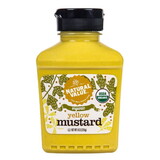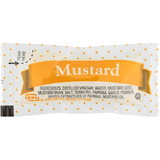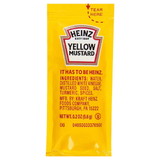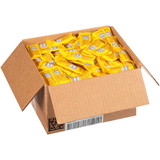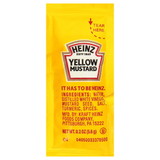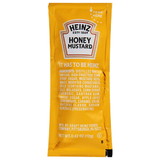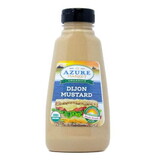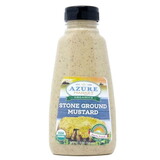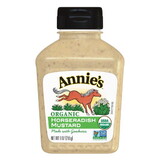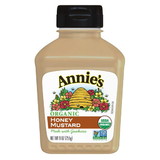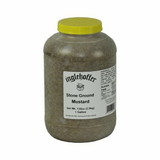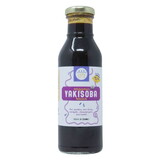Eden Foods Mirin, Rice Cooking Wine
* Click "Add to Cart" to calculate shipping and delivery time.
Product Description
EDEN Mirin is made by first washing and steaming California grown Lundberg Family Farm organic brown rice for several hours. After cooling it is mixed with a bit of rice koji (Aspergillus oryzae) called seed koji. The rice mixture is placed in a temperature and moisture controlled koji room for three days where it is stirred daily to ensure proper growth of the koji enzymes. The rice koji is then placed in cedar kegs and mixed with more steamed rice and water. This rice mixture is called 'moromi, ' or rice wine mash, that is allowed to ferment for two months. At this time sea salt is added, as well as more steamed rice, koji and water. It is allowed to ferment for another three months. After fermentation is complete, the mixture is pressed through cotton sacks and filtered to remove rice residue. It is heated to 85°C. for 3 to 4 seconds. Mirin's alcohol content, about ten percent, quickly evaporates when cooked with food or may be removed by heating it to the boiling point, and allowed to cool before adding to uncooked foods.
Mirin originated in Japan during the 15th century and was initially made by simply mixing cooked sweet rice together with sake, a traditional Japanese rice wine. In the 16th century mirin brewers began distilling this sweet wine in an effort to prolong its shelf life. This distilled wine called 'shochu', or 'fire spirits, ' had a very high alcohol content. Over the next several centuries brewers further experimented with shochu by adding cooked sweet rice and rice koji enzymes and eventually sea salt to further reduce the alcohol content. Originally mirin was very expensive and not affordable to the general public. Eventually its virtue as a seasoning was discovered and mirin began to be used in Japan's highest, most elegant form of cooking, 'Kaiseki, ' or tea ceremony cooking. Over the years mirin's popularity as a seasoning increased among the general public as it became more affordable, but the quality of most mirin sharply declined.
Today most commercial mirin is made from molasses, glucose, artificially produced koji enzymes (many of which are genetically engineered), cornstarch, ethyl alcohol, preservatives and other additives that are simply mixed with water and fermented very quickly. Chemical denaturing additives are used instead of sea salt to reduce the alcohol content. The results are less healthful and inferior in quality and flavor. EDEN Mirin is of superior quality containing no artificial ingredients.
EDEN Mirin is low in sodium and carbohydrate. It is fat free and cholesterol free. The natural sugar content in the mirin is due to the fermentation of the rice and is in the form of complex carbohydrate grain sugar or maltose. Mirin is also a source of naturally occurring amino acids, organic acids and enzymes. EDEN Mirin is mildly sweet with a hint of sour and salty flavors.
EDEN Mirin can be used as a multipurpose liquid seasoning for grilled dishes such as tofu, tempeh, fish, seafood and vegetables. It adds complexity to soups, noodle broth, sauces, poached fish and tofu dishes, marinades, gravies, salad dressings and sautéed vegetable dishes. It can be combined with EDEN Organic Brown Rice Vinegar and added to cooked sushi rice; this gives the rice a glossy appearance. To prepare dipping sauce for noodles, grilled foods, tofu, batter fried tempura and other foods, simply combine a little mirin with any EDEN Shoyu Soy Sauce and a little freshly grated ginger or a pinch of EDEN Wasabi (Japanese Horseradish) powder. EDEN Mirin produces a beautiful, shiny finish for glazing pie crusts and pastries. It can also be used in making desserts such as poached fruit and puddings. To use it in place of sugar, add one tablespoon of EDEN Mirin for each teaspoon of sugar called for in the recipe.
water, organic rice, koji (aspergillus oryzae), sea salt
Servings Per Container 20
Calories 25
Calories from Fat 0
Amount / Serving: %DV
Total Fat 0g: 0%
Saturated Fat 0g: 0%
Trans Fat 0g
Cholesterol 0mg: 0%
Sodium 130mg: 5%
Total Carbohydrate 7g: 2%
Dietary Fiber 0g: 0%
Sugars 4g
Protein 0g
Mirin originated in Japan during the 15th century and was initially made by simply mixing cooked sweet rice together with sake, a traditional Japanese rice wine. In the 16th century mirin brewers began distilling this sweet wine in an effort to prolong its shelf life. This distilled wine called 'shochu', or 'fire spirits, ' had a very high alcohol content. Over the next several centuries brewers further experimented with shochu by adding cooked sweet rice and rice koji enzymes and eventually sea salt to further reduce the alcohol content. Originally mirin was very expensive and not affordable to the general public. Eventually its virtue as a seasoning was discovered and mirin began to be used in Japan's highest, most elegant form of cooking, 'Kaiseki, ' or tea ceremony cooking. Over the years mirin's popularity as a seasoning increased among the general public as it became more affordable, but the quality of most mirin sharply declined.
Today most commercial mirin is made from molasses, glucose, artificially produced koji enzymes (many of which are genetically engineered), cornstarch, ethyl alcohol, preservatives and other additives that are simply mixed with water and fermented very quickly. Chemical denaturing additives are used instead of sea salt to reduce the alcohol content. The results are less healthful and inferior in quality and flavor. EDEN Mirin is of superior quality containing no artificial ingredients.
EDEN Mirin is low in sodium and carbohydrate. It is fat free and cholesterol free. The natural sugar content in the mirin is due to the fermentation of the rice and is in the form of complex carbohydrate grain sugar or maltose. Mirin is also a source of naturally occurring amino acids, organic acids and enzymes. EDEN Mirin is mildly sweet with a hint of sour and salty flavors.
EDEN Mirin can be used as a multipurpose liquid seasoning for grilled dishes such as tofu, tempeh, fish, seafood and vegetables. It adds complexity to soups, noodle broth, sauces, poached fish and tofu dishes, marinades, gravies, salad dressings and sautéed vegetable dishes. It can be combined with EDEN Organic Brown Rice Vinegar and added to cooked sushi rice; this gives the rice a glossy appearance. To prepare dipping sauce for noodles, grilled foods, tofu, batter fried tempura and other foods, simply combine a little mirin with any EDEN Shoyu Soy Sauce and a little freshly grated ginger or a pinch of EDEN Wasabi (Japanese Horseradish) powder. EDEN Mirin produces a beautiful, shiny finish for glazing pie crusts and pastries. It can also be used in making desserts such as poached fruit and puddings. To use it in place of sugar, add one tablespoon of EDEN Mirin for each teaspoon of sugar called for in the recipe.
Ingredients
water, organic rice, koji (aspergillus oryzae), sea salt
Nutrition Facts
Serving Size 1 Tablespoon (15mL)Servings Per Container 20
Calories 25
Calories from Fat 0
Amount / Serving: %DV
Total Fat 0g: 0%
Saturated Fat 0g: 0%
Trans Fat 0g
Cholesterol 0mg: 0%
Sodium 130mg: 5%
Total Carbohydrate 7g: 2%
Dietary Fiber 0g: 0%
Sugars 4g
Protein 0g
- Certified organic? No
- Country of origin: Japan
- Package code: GY336
- Shipping weight: 1.5 lb
- Size: 10.1 oz
- Storage climate: dry
NOTE: Please read carefully with descripton, ingredients, directions or warning on the actual product before using or consuming the Gourmet Food item.
Perishable items, and chocolates in the summer, have to ship overnight, please Contact Us to confirm actual shipping fee. If you do not want to ship it overnight, NO credits will be written if it arrives melted.
 Attention CA Residents: Prop 65 Warning
Attention CA Residents: Prop 65 Warning
 WARNING:
This product can expose you to chemicals which are known to the State of California to cause cancer, birth defects, or other reproductive harm. For more information, go to www.p65warnings.ca.gov.
WARNING:
This product can expose you to chemicals which are known to the State of California to cause cancer, birth defects, or other reproductive harm. For more information, go to www.p65warnings.ca.gov.
Return Policy
All AZU- items are non-returnable.
Need more information?
Our staff are available to answer any questions you may have about this item
Our staff are available to answer any questions you may have about this item






